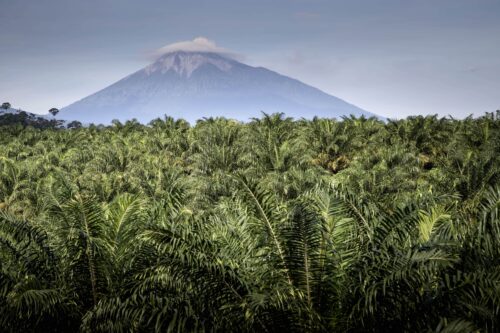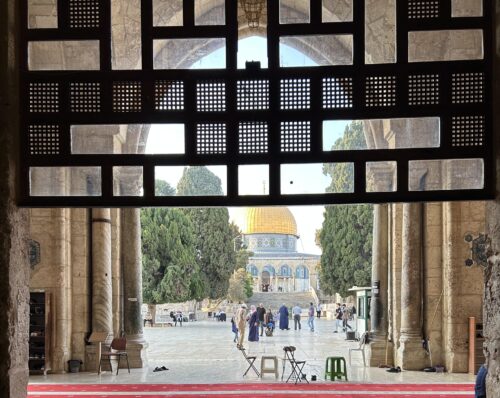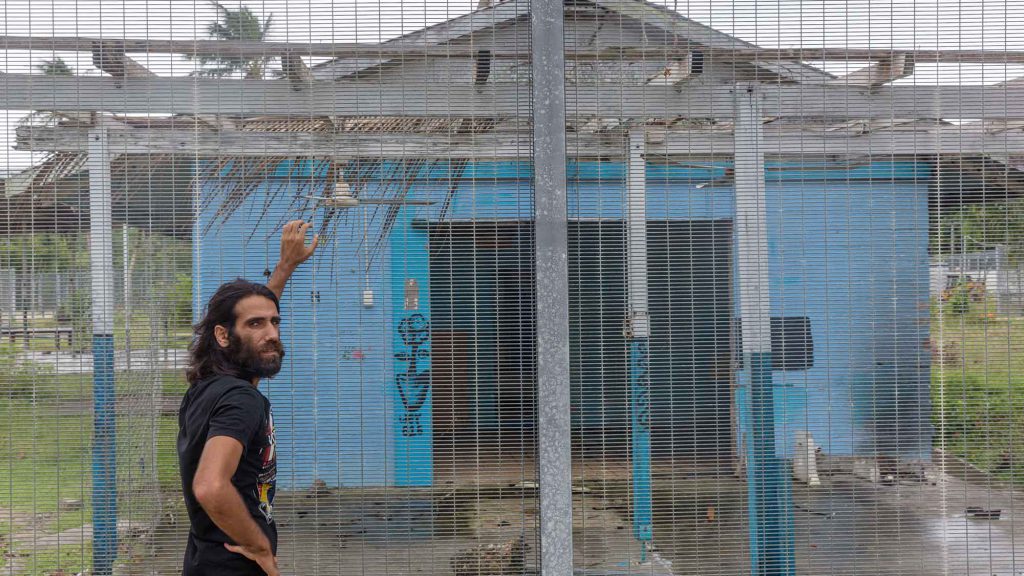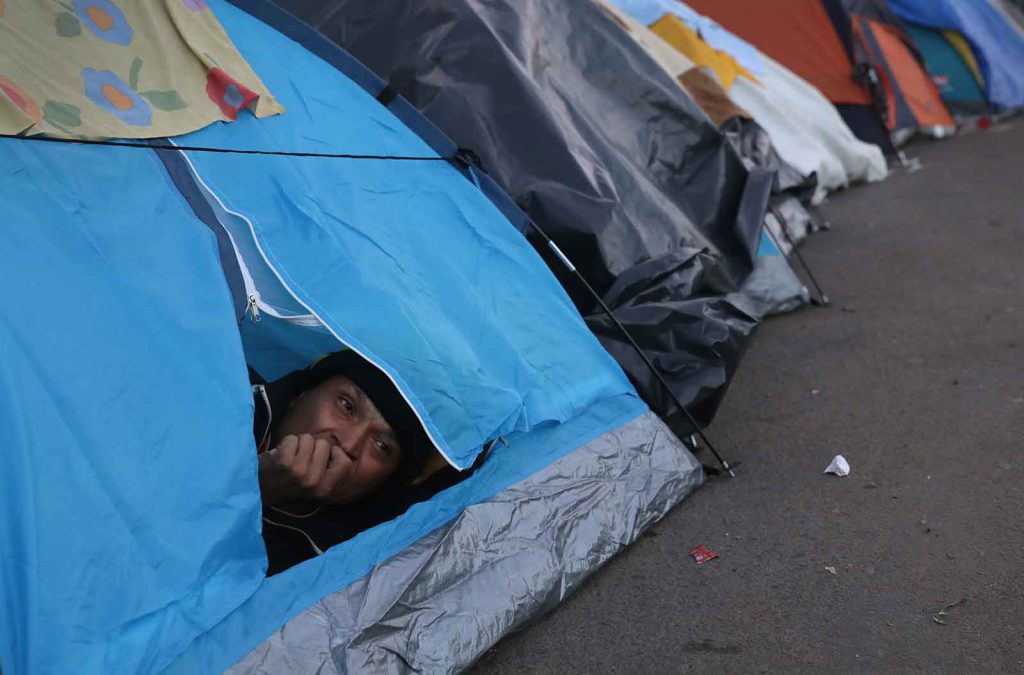Offshoring Responsibility for Asylum-Seekers
After fleeing persecution in his home country in 2013, Kurdish-Iranian journalist Behrouz Boochani boarded a boat with more than 60 other asylum-seekers that would be intercepted by the Australian Navy and land them on Christmas Island, a remote Australian territory just south of Indonesia. Like all asylum-seekers, Boochani had to abandon the places and people he knew. But he didn’t relinquish his voice—not then and not in the long years that followed.
“When I arrived at Christmas Island six years ago, an immigration official called me into the office and told me that they were going to exile me to Manus Island, a place in the middle of the Pacific Ocean,” he says in the video of his recent acceptance speech for Australia’s top literary award. “I told them that I am a writer. That same person just laughed at me and ordered the guards to exile me to Manus.”
In January of this year, Boochani was granted the Victorian Prize for Literature, with award monies totaling AU$125,000 (US$89,400), for his forthcoming book No Friend but the Mountains: Writing From Manus Prison. He wrote the book in the Persian language of Farsi, sending it to his friend and translator one message at a time via WhatsApp for fear that his work would be destroyed by detention center guards if discovered. Still trapped on Manus Island six years later, Boochani could not accept his prize in person. But the impact of his words has reached far beyond the center, sparking international debate over the “offshoring” of asylum-seekers and the integration of Australia’s radical border security model into the border policies of other nations around the world.
As global attention briefly turned to Boochani’s story, many asked how Manus and Nauru, two small islands in the South Pacific, had become permanent holding cells for all of Australia’s asylum-seekers. A look at these islands and Australia’s border policy reveals how they were designed as models for a new system of offshoring asylum processing and the impact they have had on new policies in the U.S. and across the EU.
In 2001, Australia began sending migrants and asylum-seekers who were being detained in private centers throughout the mainland to two new detention centers the government had constructed on Nauru and Manus. At their peak in 2014, Nauru held 1,233 individuals, including men, women, and children, while Manus held 1,353.
Australia’s new approach to border security gained international attention in 2013 for its novel use of media in pursuing the goal of decreasing the number of detainees by deterring new migrants and asylum-seekers before their journeys began. The government defines Operation Sovereign Borders as “a military-led border security operation” aimed at protecting Australia’s borders, preventing illegal migration, combating human smuggling, and deterring asylum-seekers from risking their lives at sea.
The multibillion-dollar campaign to promote that effort includes a video, No Way. You Will Not Make Australia Home, featuring an Australian general speaking directly to those seeking asylum; a feature film, Journey, starring a young Iranian mother and child seeking safety in Australia; and an 18-page graphic novel, depicting Afghan asylum-seekers suffering from extreme physical and mental health issues in an offshore detention center in the Pacific Islands. The campaign was translated into 18 different languages.
Access to detention centers on Manus and Nauru has been tightly controlled since their establishment, but reactions from the international community have grown louder as news from inside slowly trickles out—stories of routine abuse, rape, and death as a result of beatings by guards and suicide.
After Australia finally gained a seat at the U.N. Human Rights Council in 2017, the country received a “scathing report” during its first week in session. In a 20-page exposé, the U.N.’s special rapporteur on torture, Nils Melzer, wrote that the cause of much abuse of migrants results from “the growing tendency of states to base their official migration policies and practices on deterrence, criminalization, and discrimination, rather than protection, human rights, and non-discrimination.” Critics argue that Australia’s system is a perfect example.
While the transfer of detainees from the main detention centers on Nauru and Manus to other smaller facilities on the islands, like the one that currently holds Boochani, began in response to public pressure, the Trump administration made a startling move. In December 2018, officials announced that the U.S. would begin requiring all asylum-seekers at the southern border to return to Mexico until a court ruling on their cases. The policy is an unprecedented step toward outsourcing the United States’ asylum processing system by an administration still threatening the construction of a wall between the U.S. and Mexico.
Similar to detainees’ lives on Manus and Nauru, asylum-seekers who are sent back to Mexico are left without the basic social services that are guaranteed to them under international law: rights to interpreters, legal counsel, emergency medical assistance, and state-sponsored accommodation in a safe location while their cases are under review.
In 2016, the U.S. processed 73,081 asylum cases—an average of approximately 200 each day. The system is designed to accommodate large numbers of asylum-seekers. While claims about a “crisis” at the border may be politically advantageous for the current administration, shoring up support to outsource care for asylum-seekers, such assertions are simply not supported by the numbers. The only legal way to seek asylum in the U.S. or other countries around the world is to arrive at the border and file an application for protection. The right to do so is fundamental to human rights law.
It appears the Australian model had a similar impact across the EU, where leaders at a 2018 EU summit debated the construction of offshore processing centers in Libya, Algeria, and Morocco. These centers would stop the large number of migrants and asylum-seekers fleeing extreme poverty and conflict across the African continent in hopes of reaching Europe’s southernmost borders in Spain, Italy, and Greece. However, popular arguments for “punishing” the journeys of “illegal” persons in a practice that Spanish leaders termed “push-backs” is a far cry from the EU’s legal conviction that every individual has “the right to apply for asylum.”
But if Australia, a democratic nation signatory to all major international human rights conventions, has successfully outsourced the process of asylum review with no punishment for its violation of international laws protecting the rights of refugees, what is to stop European nations and the U.S., which receive significantly more asylum-seekers every year, from doing the same?
With both populist movements and migration on the rise around the world, the most pressing challenges that we will face as a global community are ensuring the basic human rights of those who have had to flee home.
According to Article 14 of the Universal Declaration of Human Rights, every man, woman, and child, regardless of their place of birth, has the basic right to seek asylum in other countries. At the very least, it is our global responsibility to ensure that migration journeys do not trap individuals in places as dangerous as—or even more threatening than—those they are fleeing.
Boochani’s book speaks to this responsibility. In his acceptance speech, he addresses the global community when he says, “This [award] proves that words still have the power to challenge inhumane systems. … I have been in a cage for years, but throughout this time my mind has always been producing words, and these words have taken me across borders.” He adds, “I truly believe words are more powerful than the fences of this prison.”
Nauru and Manus have set a dangerous precedent for nations seeking to stop the flow of asylum-seekers across their borders. Could they also serve as a warning for nations seeking to protect international human rights standards in light of expanding migrant and refugee “crises” around the world?
The Australian government knew the power of words when they designed a campaign that uses stories and images to change the flow of people across international waters. The people of Australia similarly knew the power of stories when they awarded their top literary honor to a man who remains trapped as a result of that campaign. Indeed, Boochani has tried to establish a “new language”—employing everything from fiction and poetry to critical analysis in his attempts to unveil the power structures that have left him exiled for the past six years.
Perhaps he has shown us a counternarrative to Australia’s multimedia campaign. The question is: How will the rest of us harness the power of storytelling next?



































